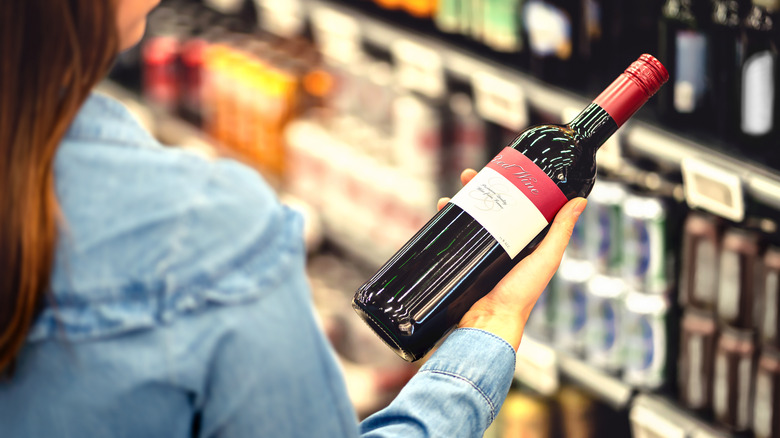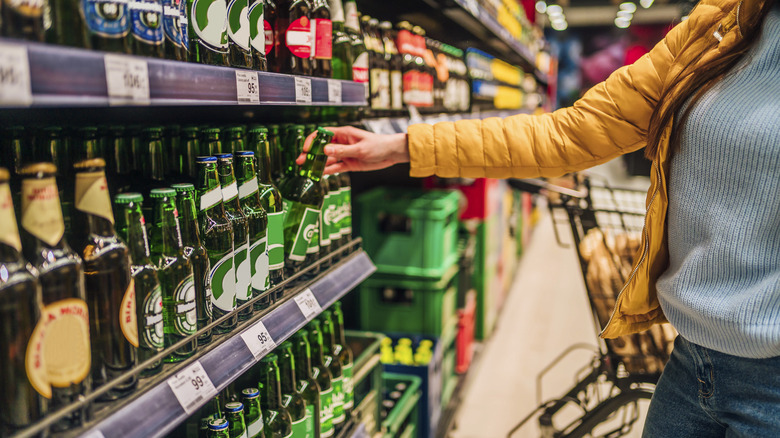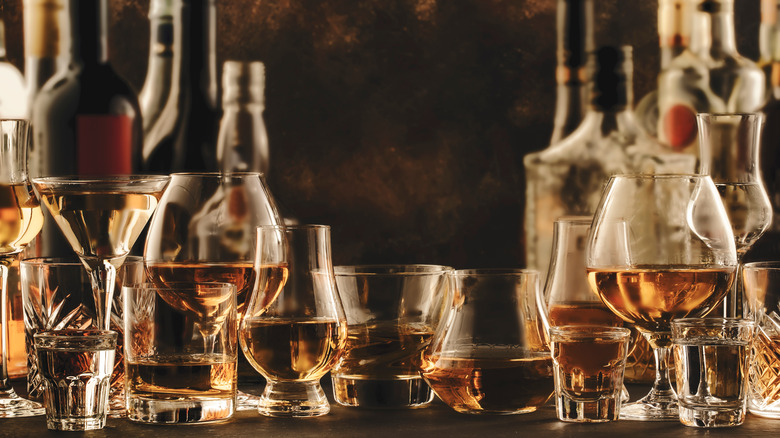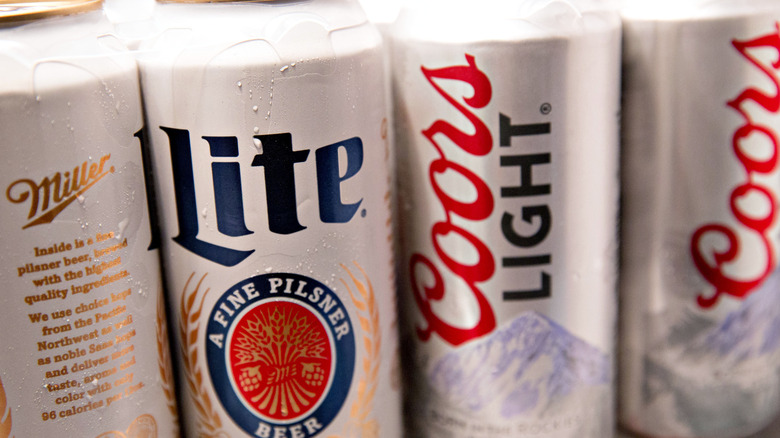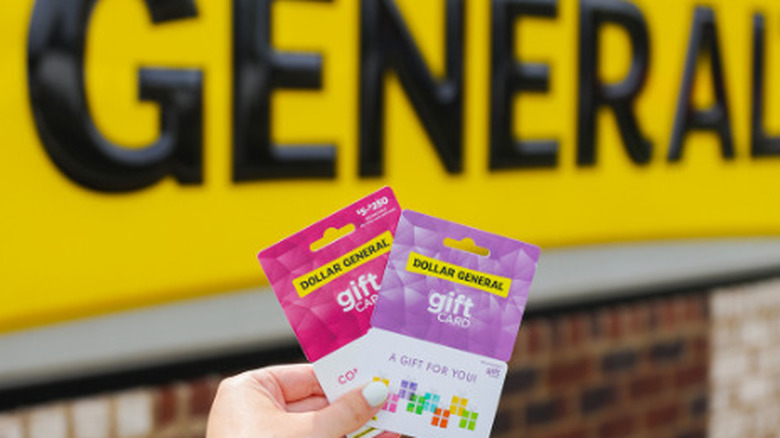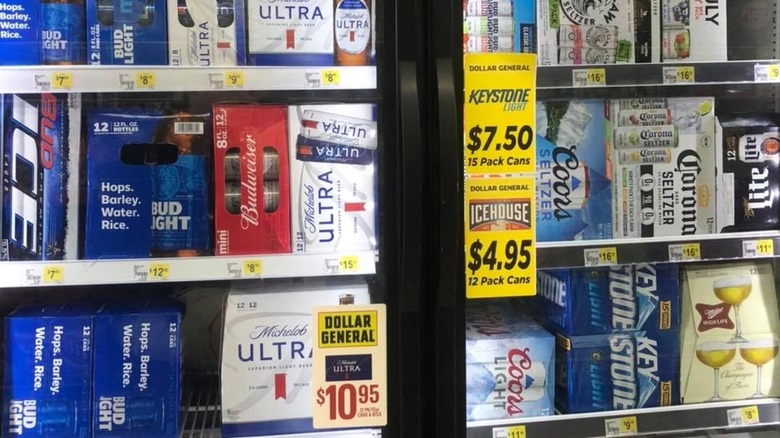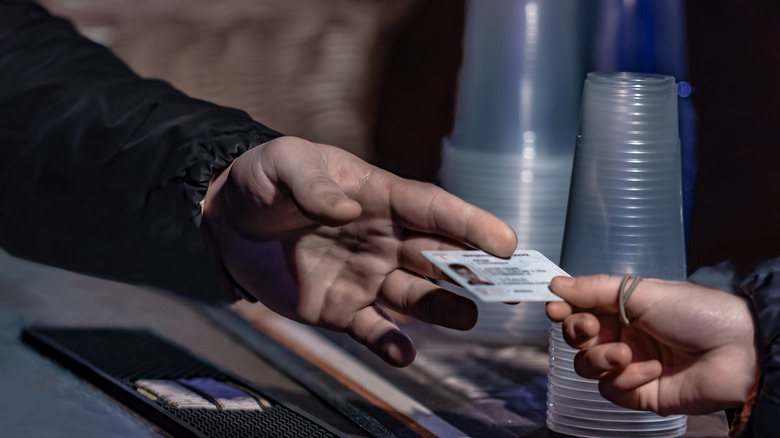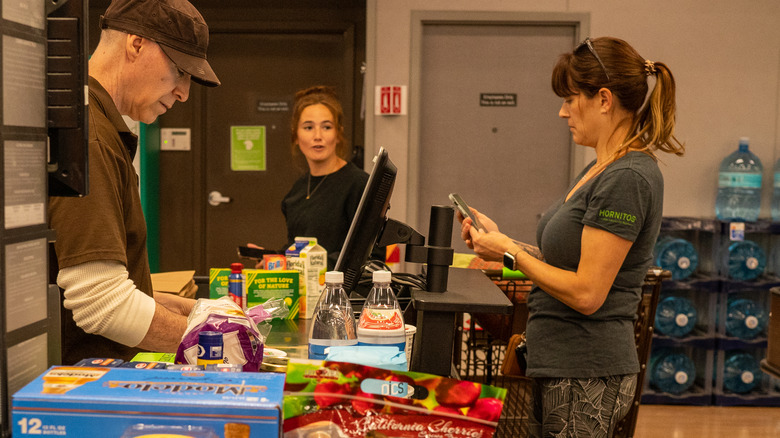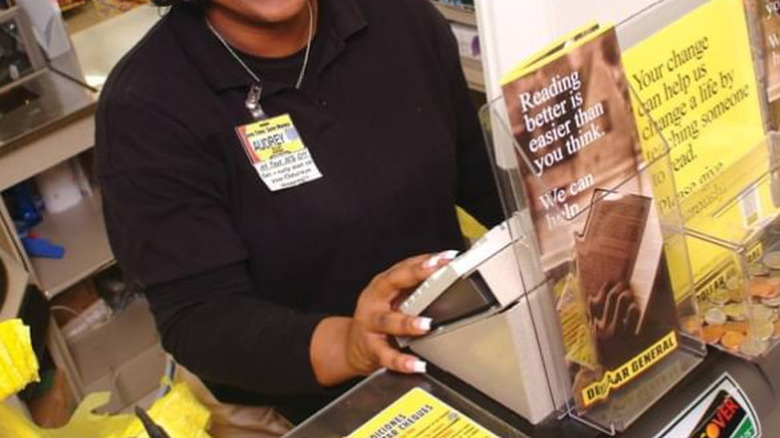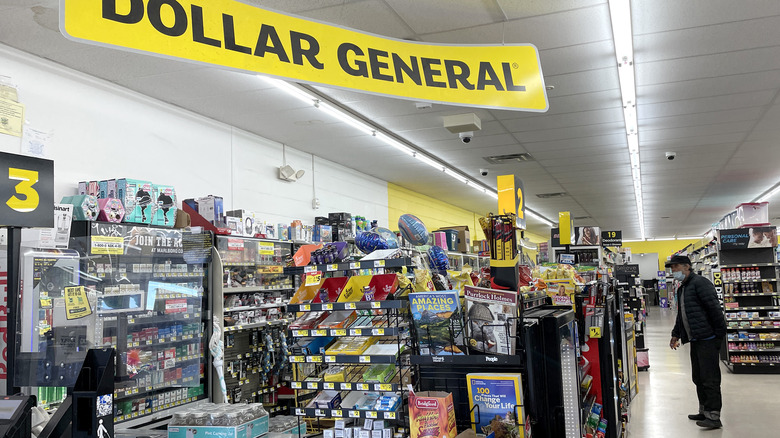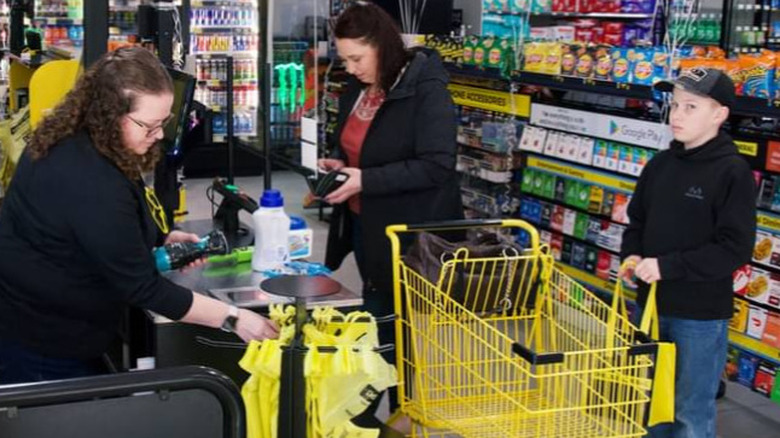Here's What You Need To Know Before Buying Alcohol At Dollar General
Cheap snacks, discounted diapers, affordable seasonal decorations, or kitchen ware — all of these things and more we associate with Dollar General, one of America's largest discount retailers. But something that doesn't come to mind for many of us when thinking about the bargain department store? Well, quite frankly ... alcohol.
"What about this new Dollar General ... complete with a full wine spread?" says a dazzled customer on Facebook alongside a posted photograph featuring an aisle impressively stocked with well-known brands. Little do many consumers know, in 2008, the bargain retailer began stocking its shelves with an abundant alcohol selection that remains to this day, tucked away in many of the nation's Dollar General locations. The colorful beverage assortment comes discounted, of course, and it can make for a more frugal purchasing option the next time you're needing to pick up a bottled gift for a friend or select something especially bubbly for a date night surprise. But because purchasing alcohol can sometimes be a bit of a slippery slope, before you stop in to skim the selection, check out the following tips to get the most out of your shopping experience. Here's what you need to know before buying alcohol at Dollar General.
Not all Dollar General locations carry alcohol
Given that there are more than 19,000 Dollar General locations in the United States, it is very likely that there is a store just down the street from where you live. But before you rush off to the nearest one in search of a suitable six-pack of beer to take to the family barbecue, make sure you do a little digging to ensure there will be some options waiting for you when you get there. This is because not every single one of those locations is permitted to carry alcohol.
Laws regarding alcohol sales vary from location to location in the United States, so each individual Dollar General is at the mercy of the state — sometimes even the county or town — in which it resides. In Minnesota, for example, wine and liquor cannot be sold in regular retail stores; they are sold only in alcohol-specific locations and sometimes only in city-owned liquor stores. And certain counties, such as Sheridan County in Kansas or Decatur County in Georgia, are completely dry by default, meaning no alcohol can be sold within their boundaries. In these places, you obviously won't be able to snag a six-pack. Knowing the laws surrounding alcohol sales in your place of residence should give you a pretty good idea right off the bat whether or not your local Dollar General will be stocked — but you can always place a call to your surrounding location if you're unsure.
You'll be able to buy wine, beer, and champagne ... but no hard liquor
If you're seeking a handle of tequila for homemade margaritas or a bottle of vodka for Moscow Mules, you'll likely have to work a stop other than Dollar General into your errands run. This is because while the bargain store sells a variety of wine, beer, hard ciders, spiked teas, and occasionally champagne, it reportedly leaves hard liquor off its shelves completely. Though the exact reasons for this haven't been blatantly advertised by the company, it isn't hard to speculate why when one begins looking into the complexities involved with liquor licenses.
Becoming licensed as an establishment that sells hard liquors like rum, bourbon, or whiskey as compared to one that sells only beer or wine is a very different process ... and notoriously more difficult. While obtaining a beer and wine license is generally considered relatively easy, the process of becoming permitted to sell spirits is typically more expensive, lengthy ... even competitive, as some areas may limit the total number of liquor licenses available. In addition, the procedure is unique in every state, adding to the intricacies of the whole thing — especially for a chain establishment with locations sprinkled everywhere. While there may, of course, be additional reasons for Dollar General holding off on the hard stuff, we could certainly understand if licensing alone was enough to keep the chain sticking to cabernets and lagers for the foreseeable future.
While you will likely get a deal on wine, whether you'll save money buying beer there is a toss-up
Let's face it: Wine can be expensive. Vivino, an online wine marketplace, reports that the median price of a standard, mid-level bottle of red wine in the United States is $15.66 ... and the better the quality of the wine, the higher the price. The costs can quickly add up from multiple trips to a liquor store, so bargain retailers make a great resource for regular wine drinkers. With bottles going for less than $10 a pop at Dollar General, you're easily able to enjoy a nightly glass (or two) during the week without breaking the bank. However, it appears that when it comes to beer, the price difference at Dollar General may not be quite as notable when stacked up against the other sellers.
For example, Costco's website lists a 36-pack of Coors Light available for $23.99 — shaking out to about 66 cents per can of beer. Dollar General's website lists a 12-pack of the same product for $15.15, which amounts to about $1.26 a can. In this case, Costco obviously offers the superior deal — and while prices may vary depending on what city you are in, you may want to whip out the calculator and do a little investigation at some of your local stores and grocers before dedicating yourself to purchasing all your beer from Dollar General.
You won't be able to use your Dollar General gift card to purchase alcoholic beverages
Gift cards — those tiny plastic rectangles we joyfully load up with money credits toward restaurants and stores of our choice — are just as wonderful to give as they are to receive. It's like being a kid in a toy store again, strolling through the front doors of a market with a gift certificate in hand, the aisles full of treasures and endless possibilities for what you might spend it on. Well, maybe not quite endless — at least not at Dollar General.
At the bargain retailer, you won't be using that shiny card loaded with cash toward the delicious-looking bottle of sparkling wine you've been dying to try any time soon. Unfortunately, alcohol is one of the few items that customers cannot use their gift cards on, according to company policy. This restriction also extends to tobacco products and e-cigarettes, so make sure you aren't banking on any of these items when you show up to spend the store-specific credit your grandma sent you along with your birthday card this season.
Coupon overages cannot be applied toward alcohol purchases
Let's say you show up for your weekly shopping trip at Dollar General with a shiny coupon for $2 off of dishwasher detergent — which normally goes for $3.50. Turns out, though, the store already has it marked down to $1.50. You wander up to the checkout, unsure whether or not the coupon you plucked can still be applied on top of the steal, and the super nice employee tells you that you are still able to use your $2 credit. You're excited and then some when the clerk tells you this next part: Because the detergent is already marked down to $1.50, the store technically owes you an additional 50 cents. This is what it means to have a coupon overage, and generally, this little bit of extra bit of cash — no matter how small — can be used by customers toward other purchases.
But the next time you stop at Dollar General with your impressive array of coupons, intending to put any overages toward a bubbly beer or a delicious bottle of white wine, you'll have to plan to purchase a different product on your list. According to the Dollar General coupon policy, overages cannot be used toward loading gift cards or phone cards or toward buying tobacco products or — you guessed it — alcohol. A bit of a bummer, perhaps — but luckily, there's always something else sitting on those aisles that you could probably pick up.
Even if you're over 21, be sure to bring your ID
Some of us have probably had a moment where we — or our parents or grandparents — purchased alcohol without the attendant asking to see identification. When a consumer is obviously over the legal drinking age of 21, checking identification may feel like a waste of time. But for Dollar General, an identification check — regardless of the age of the purchaser — is a requirement for each and every sale. The company is apparently so diligent about its identification checks that it has inspired numerous threads on Reddit.
"Why is DG so strict on ID," reads the title of a post in the Dollar General channel. "When I say that I mean people who look old old not people in their late 20s." Multiple Redditors and those saying they are employees of the retail chain hopped on to explain. "It's a combination of policy and law," shared one poster. "Might seem dumb ... but it isn't worth losing our jobs. Some (store managers) even check cameras to see if their associates are checking IDs and will fire people who skimp." Another commenter relayed that even if the late Betty White had stopped in at 99 years old to purchase a beer, the employees would have to ask for her identification as well. Moral of the story: Make sure you doublecheck — or triple check — that you have identification on hand when you visit Dollar General for alcohol.
There are sometimes blow-ups in the store over ID checks
While being asked for identification during a liquor purchase might feel a bit like a compliment as we age, this is apparently not a sentiment shared by some of Dollar General's clientele. According to employees, some customers take issue with the question — and have no problem sharing their displeasure.
On a Reddit post in the Dollar General chat, employees share incredible — even downright unbelievable — reactions from angry customers when asked to present a valid form of ID during alcohol transactions. From people throwing their hands up or walking out or those who outright refuse, the cashiers at the bargain shop have seen it all. One employee described a situation in which a man who did not have his ID (on account of it having been revoked due to a drunken driving charge) walked out with no beer, hopped into his truck, and illegally drove away without a license.
"What annoys me are the people who think I'm the one that wants to see it at all," noted one employee. "It's a company policy ... I'm just not losing my job over you wanting to throw your lil temper tantrum." So when you find yourself personally asked for identification at Dollar General, even if it does feel a waste of time ... remember that the people behind the counter are just doing their job. Consider being compliant — and more importantly, kind.
The person ringing you up is seller certified
While an alcohol transaction might seem as simple as looking at an ID, there's often more to it. Many employers in the U.S. require some sort of seller-server training for workers who will be handling transactions for beer, wine, or spirits. The purpose of this coaching is to provide a basic understanding on how to make responsible sales in order to keep both the employees — and the company for which they work — safe from liability.
For cashiers at Dollar General, this training is often a computer-based course common among retail sellers ... and according to employees, in order to be in compliance with most state laws, they are technically supposed to have this certification completed before they can ring anyone up at the register for a pack of beer. On a Reddit thread under the Dollar General community, one worker questioned whether they should hop in and help with checking out when they were not yet computer certified for alcohol sales — and the overwhelming response from fellow employees was no. Interestingly, some workers report that in some regions, the standard computer training itself is not enough; other states are even more strict in their requirements. "In my state, you have to have a liquor license," noted one. "Still have to take the (course), but dg (Dollar General) pays for the license and it's good for 2 years." Who knew just how much goes into each beverage purchase we make?
Workers who are minors can't ring up alcohol sales -- and it's sometimes a problem
Many companies won't hire workers who are under 18 — Dollar General, however, can be a great option for high schoolers looking for employment. As long as it's permitted in the state in which the store resides, the company will hire minors onto its staff. While this is a win for young people themselves, some consumers — and even coworkers — report negative feelings regarding the policy. This is because people under 18 cannot legally ring sales up for either tobacco or alcohol purchases.
On a Reddit thread about Dollar General, one commenter expressed his discontent with youngsters working the counter. "Oklahoma can now hire 16 and 17 year olds!" reads the description. "Not a fan of this change, they can't sell alcohol or Tobacco!" While plenty of employees on the thread praised the work ethic of their underage coworkers, the issue of selling restricted substances was an undeniable inconvenience. "We started that (hiring minors) in Texas last month. Besides not selling ... They also can't stay after 10 pm. And yes. The most annoying thing is having to come to the register so many times to approve the (sale) of wine, beer and cigarettes," a user said. Another said that in order to avoid any discrepancies in the checkout process, their location placed their minor workers only in stocking positions.
You can return alcohol to most locations -- but only to the original store of purchase
You finally make it home after a long day, excited to pop open the bottle of wine you got for a total steal at your local Dollar General. You reach into the bag and set your treasure on the counter ... only to find that you accidentally purchased the white wine, not the red wine as intended. Since you can't stand the variant you accidentally bought, you dig the half-crumpled receipt out from the recesses of your purse, wondering whether the store will take it back.
Thankfully, the answer is yes. According to Dollar General's official return policy, alcohol products can be taken back — but only with the receipt and only at the original location of purchase. So while there's no hope in you swinging by a different Dollar General that's closer to work the next day, you can still hope to get your money back at that same store where you found the deal in the first place. Another thing to note is that it will be a cashback return; no simple exchanges on alcohol products are permitted. This may add a step — you will have to return that accidentally purchased wine, walk back to the alcohol aisle to hunt down the red you really wanted, and pay for that at the register — but you won't be stuck drinking something you can't stand. That's a win in our book.
